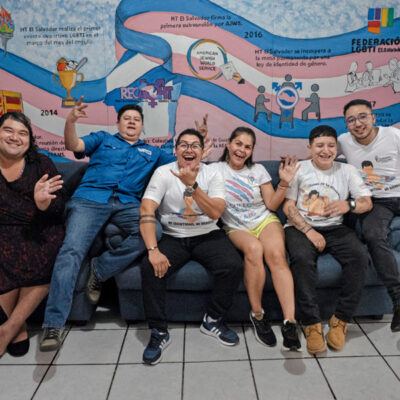As the COVID-19 pandemic drags on, AJWS grantee-partners have shifted their work dramatically to meet the most desperate needs of their communities: food, protective equipment, life-saving information and more. Below, read how grantees in India and Mexico have adapted and evolved as COVID-19 tears through their communities. AJWS will continue to stand by all of our grantees in 19 countries during this global crisis—and we will update you on their life-saving work right here.
India
The COVID-19 pandemic has hit vulnerable communities especially hard in the developing world. Of these populations, transgender people face additional barriers—from being denied healthcare because they’re trans to coping with financial instability that’s dramatically increased because of lockdowns, as so many were working within the country’s informal economy. Since 2009, AJWS grantee-parter Payana has been mobilizing groups within the larger Indian LGBTQI+ community and training them to advocate for their human rights on a regional level. But since the COVID-19 crisis began gripping India two months ago, Payana pivoted its work dramatically to make sure India’s trans community does not fall through the cracks during this extremely difficult time.
In recent weeks, Payana launched a relief campaign to deliver groceries and medical supplies to trans people, including 100 HIV-positive trans people, across the state of Karnataka in Southern India. Payana also joined forces with several other Karnataka-based organizations to create a fund that will support trans communities and provide meals for those in need.
They are the perfect example of AJWS’s adaptive COVID-19 strategy: Payana remains a human rights and advocacy organization, and they will continue creating a fair and equitable world for trans people long after the pandemic is over. But for now, they recognize that their material support will keep these truly vulnerable people from the brink of starvation. Payana’s focus on India’s trans population is part of AJWS’s Sexual Health and Rights strategy to support communities within the larger LGBTQI+ sphere who are less often reached by human rights organizations, including transgender and intersex people, among others.
Mexico
Across the developing world, COVID-19 has highlighted just how close millions upon millions of people are to being unable to feed themselves and their families. Severe government measures to prevent the spread of the virus have, in many cases, exacerbated existing poverty and hunger—and pushed many people over the edge.
In Oaxaca, Mexico, the closure of vital roads has blocked delivery of food and supplies to remote, rural areas, rapidly causing a food shortage among indigenous and rural communities. AJWS grantee-partner UCIZONI has long been working in this area, operating as a union of indigenous people protecting their culture and autonomy through education and political advocacy. But the pandemic has escalated the threat of hunger for thousands of people in the communities they serve. Their response? To feed as many vulnerable people as possible.
UCIZONI collaborated with the municipal government and local health departments to coordinate a widespread relief campaign, which has distributed critical food aid and protective equipment like hand sanitizer and face masks to over 7,000 people in 30 different villages in the region. UCIZONI planned their distribution strategically—first delivering aid to single mothers, elderly people and people with pre-existing illnesses. Secondary distributions supported sanitation workers and small business owners.
UCIZONI’s non-pandemic work falls squarely within AJWS’s Land, Water and Climate Justice strategy to strengthen collectives of marginalized rural and indigenous populations. Facing COVID-19, however, UCIZONI represents another example of a grantee-partner adapting its work to meet the most pressing needs of their community—and AJWS will continue to support our grantees as they determine what these needs are. Our support will remain unwavering, ensuring that these organizations on the frontlines can indeed reach the most vulnerable people on earth in this unprecedented time of crisis and uncertainty.
All information is accurate as of May 21, 2020.


